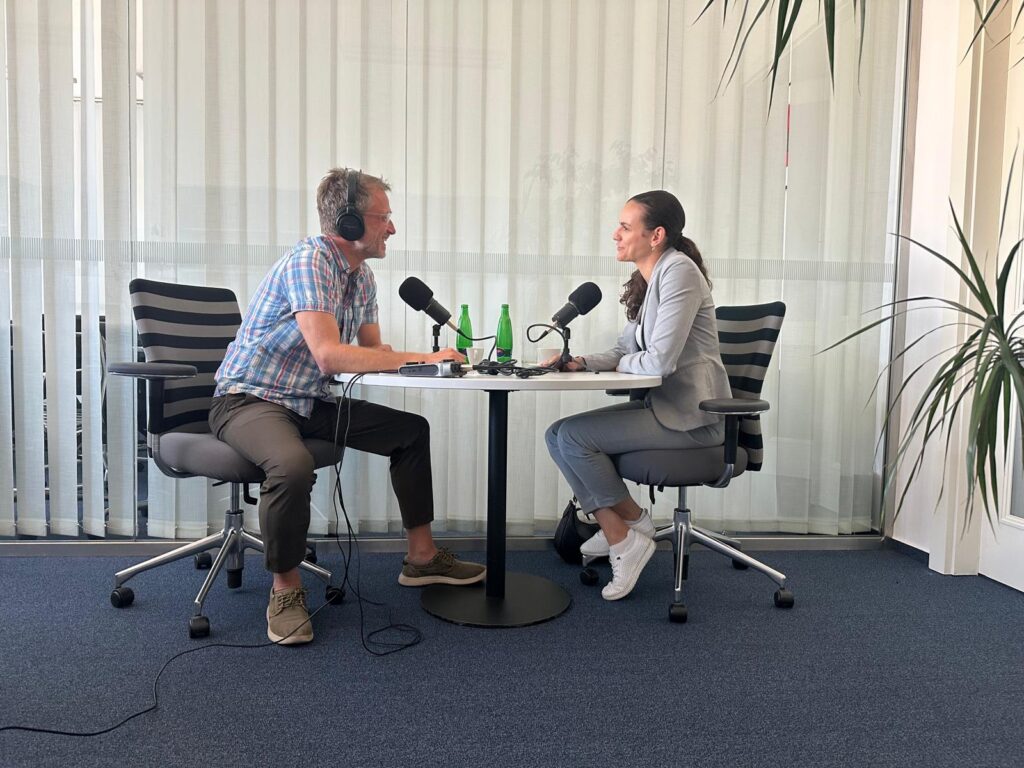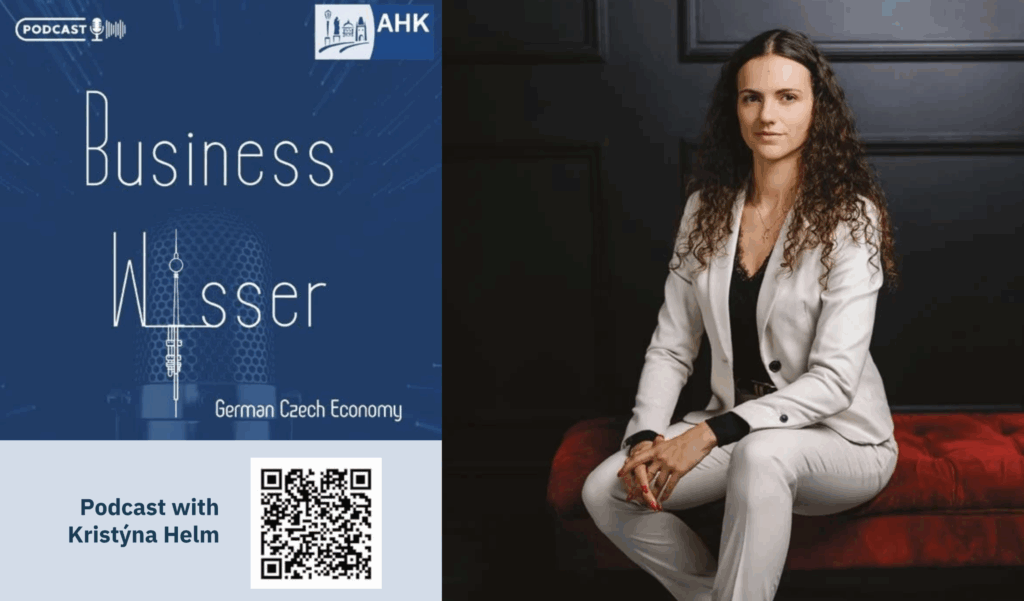“Because you only have one shot”
Interview with Kristýna Helm (AOBP) on how to approach the defence industry as a potential supplier
Whether it’s on the board of the NATO Science and Technology Organization, in the NATO Industry Advisory Group, or as the Czech National Contact Point for the European Defence Fund, Kristýna Helm is present in the most important forums. As the Vice President of the Association of the Czech Defence Industry (AOBP) she is giving the sector an international voice. At the same time, she shares her expertise as a lecturer at the University of Economics in Prague. This November, Kristýna Helm will be one of the speakers at the German-Czech Economic Forum.
Kristýna Helm, these days the world can change overnight. We might wake up the next morning in a world that looks very different. When you wake up in the morning, in which of your roles do you see the greatest dynamics right now? Where is the pressure the highest in your work?
Do they understand?
When you explain to them the complexity of the defence environment, what they have to do for it, and how long it takes to really get into the field, they sometimes are disappointed…
We will come back especially to that very important point. Actually, you’re one of the youngest leaders in Czech defence. Does it take special qualities to make it in this industry?
I believe the most important quality for any field is the passion about what you do. I work with governments, with academia, with NATO, the EU, and then with industry, with business sector. And I love the complexity of seeing the different points of view and being able to communicate on different levels. And I also enjoy simplifying the complexity and bringing it into the lecturing that I’m doing very passionately at the University of Economics in Prague, and also currently in a commercial course for companies. It’s called Understanding Defence – a Business Perspective.
We will come back especially to that very important point. Actually, you’re one of the youngest leaders in Czech defence. Does it take special qualities to make it in this industry?
I believe the most important quality for any field is the passion about what you do. I work with governments, with academia, with NATO, the EU, and then with industry, with business sector. And I love the complexity of seeing the different points of view and being able to communicate on different levels. And I also enjoy simplifying the complexity and bringing it into the lecturing that I’m doing very passionately at the University of Economics in Prague, and also currently in a commercial course for companies. It’s called Understanding Defence – a Business Perspective.

What is the biggest difference between civil industries and the defence industries?
I think the biggest difference is the customer. For defence technologies, the only customer that can be legally a customer, is a state, a government. Companies are under special circumstances, in a very sensitive field, so you cannot access the customer easily with a cold calling or you can’t just go to the Ministry of Defence and say, hey, this is a great technology. And everything takes so long because governments, especially in the democratic world, are extremely inefficient in the way that they are doing defence procurement.
“The biggest difference is the customer”
Is that mostly about bureaucracy?
No, it’s about the sensitivity and the fact that you may wait for answer for weeks, not really being able to catch up with the people that you talk to. You don’t get any business cards, when you are approaching your customer, the soldiers, at an exhibition or somewhere else…
What I’ve heard is that the defence industry is in a kind of bubble compared to other industries, because for a long time they were under the radar of public awareness.
Exactly. And the bubble is not just related to the final customer, but it’s also related to the supply chain. The prime contractors, the OEMs, are not that open to cooperation with new companies, unless they really actively seek something concrete. And you cannot really access them very easily either. It’s a very closed bubble, .
How has the role of defence changed in recent years, with the war coming up in 2022?
The biggest change is in the shift in perception of the importance of the industry. Now, this is clear, everyone understands.
What makes the Czech defence industry stand out, and how is it structured?
It’s very different from the industries in countries of our size. We have several large players who acquire other companies in the field. We have currently four, and the fifth is really growing quickly: Czechoslovak Group, Omnipol, Colt CZ Group, STV Group, and the growing one is PBS Group.
And the SMEs?
They are the backbone, 70% of the members of AOBP are SMEs. Because in many areas you don’t need to have a large business to deliver solutions, like in the cybersecurity. You can have a team of 25 people and have a breakthrough technology.
What also makes the difference is that we have a long tradition, a lot of experience from the past, going back to Habsburg monarchy. But after the Velvet Revolution and then the political thrive for peace, which unfortunately went hand in hand with thinking that no defence industry means peace, many companies were sold or shut down. But luckily there were many people who are still active in the field, who saved it, who saved the technologies. Many companies over the past years got back into the ownership of the Czech businesses. We have 90% of exports all across the world, and the feedback is that we are very flexible compared to other countries, other large companies.
Why is that compared to other companies, other countries?
It’s really the mindset, because if you have a large player coming from the US, from France, from Italy, they say “take it or leave it”, because they have large markets in their countries. We don’t have that. Only 10% is consumed by our own army. And that means that the companies have to really try hard to get to the international markets, and one of the ways is to be flexible. Be flexible with contracting, be flexible with deliveries, flexible with products, and make sure that you really gain the customer by some added value with great technology and very successful products.

Are there particular skills in Czech defence industry?
The Czech defence industry and the Czech Army are very well known worldwide for their specialization and for their abilities in the field of CBRN, chemical, radiological, biological, and nuclear weapons and the systems against them. So you can picture it as any kind of filters, detectors, and many technologies these days that are preventing or making the potential attack of these weapons less harmful for the soldiers and the civilization. We have very good cooperation with universities, for example with the Czech Technical University and the Brno VUT University in new materials. And then we have companies that have these emerging and disruptive technologies, like Spaceknow. They’re analyzing satellite data for the purpose of decision-making of the armies. They are very active and helpful in Ukraine now. And it’s also a dual-use technology. Another great advantage is that we can produce ammunition in the country, from small to large calibers. And we have multiple companies that can do that.
How big is the share of the defence industry in the economy? In automotive, it’s around 9%.
It’s around 1-2%. But I think the difference between the automotive and defence industry is the added value. So in automotive, it’s usually quite low. In the defence industry, you’re getting on average around 40%, which is a lot. And it makes sense because it’s very specific, custom, tailor-made, and sensitive equipment and production does not come in large scales.
„It’s very specific, custom, tailor-made, and sensitive equipment and production does not come in large scales“
Innovation is the key and comes also very often from startups. What about the defence R&D by the government?
This is one of the things I hope that the next government will change. The defence R&D in the Czech Republic is really sad. It’s not just in the amount of budget, but it’s also in the efficiency of cooperation between the end user and the industry. The best way is the joint R&D project, where industry can develop according to needs of the end-user, this is crucial for investing in the right way.
„The defence R&D in the Czech Republic is really sad“
So what is the most important step you expect from the next Czech government besides joint R&D projects?
What would help the most is to be clear about the short-term and long-term acquisition plans. The government needs to be looking beyond the election period and be able to help the Czech industry to get into international development of next generation platforms that the armies will be purchasing in 10-15 years. That needs a strong political and financial support.
The German government put 500 billion euros on the table for defence right away. Do you feel a little bit jealous when you look over to Germany?
Not really, because these are just big words. It’s great to have the budget, but I also have the feedback from German companies in the defence field that it’s not yet clear where the money is going to go and in what time period and so on.
Germany is Czechia’s top economic partner. Which German companies have invested in Czechia in your sector?
For example, we have Rohde & Schwarz with the cable assembly products that have a facility in the Czech Republic, quite large, very successful. There is a partnership between, for example, Colt CZ Group and Rheinmetall in certain areas. But the cooperation between the Czech industry and German industry is not as tight as I believe could be. It’s about how do you bring the parties together, and you need to go from both sides, the governments and the industries. I hope also your chamber is working on that at the moment.
We do, so let’s come back to dual-use technologies and automotive. The Czech automotive sector is under pressure as well as the German, the European in general. Quite a few automotive suppliers that are trying to get a foot into the defence sector get frustrated and drop out. What are the biggest self-made barriers?
There is a massive difference, that usually people from automotive do not have in mind, because they produce commercial vehicles in millions of pieces. We produce military vehicles in tens, hundreds. And that’s where the economies of scale from the automotive doesn’t work. In defence there is a limited amount and higher costs of R&D. And this is usually compensated for by the highest added value. That’s where, usually, the disappointment comes from the automotive. You do not play really that much with the price, but you play with added value in terms of material, in terms of reliability of the production, in terms of availability, and flexibility, to what extent you can really make it applicable to a specific platform. And then, of course, you need to meet all the requirements, all the certifications.
„Don’t try cold calls or cold emails„
From the perspective of automotive and other civil industries, please give us one “No-go” and one “Go-for”.
It’s a world that is widely dependent on personal contacts, on long-term mate networks that hardly let anyone from the outside world in. Don´t try cold calls or cold emails. Contact the companies on a personal basis. I can highly recommend on defence fairs. This is the top opportunity to meet defence companies.
One other no-go is that you approach the customer with your current product portfolio and expect they will do the work to figure out how it matches their needs. Do your research properly and understand your potential customer first, and then you tailor make the offer. Because you only have one shot.

Image Sources: AOBP, Ivana Barkova

